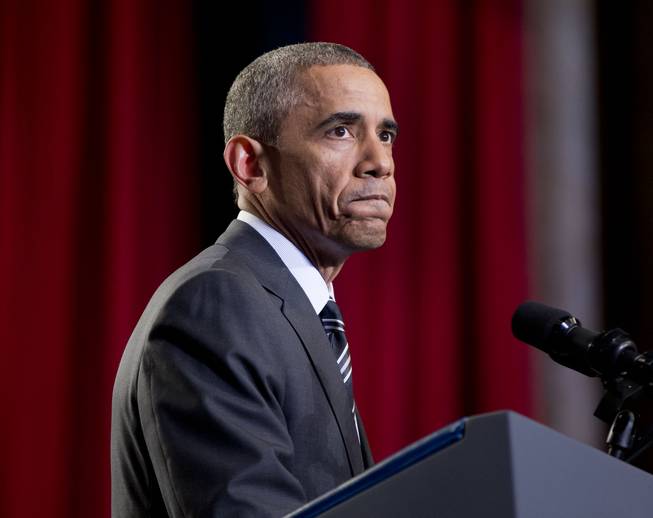
Pablo Martinez Monsivais / AP
President Barack Obama pauses as he speaks about Ferguson, Mo., before speaking at the Copernicus Community Center in Chicago to discuss immigration reform, Tuesday, Nov. 25, 2014.
Wednesday, Feb. 18, 2015 | 2 a.m.
For Brenda Terrones, the latest twist in a months-long political fight over immigration reform has all but dashed every hope for a life without the threat of deportation.
A federal judge on Monday temporarily halted President Barack Obama’s newly announced deportation deferral plan, and the injunction left millions of potential beneficiaries like Terrones in limbo just two days before they could begin applying for legal protection.
“They tell me not to be afraid and they tell me not to lose faith,” Terrones said in Spanish at an information session Tuesday night put on by local immigration advocates who assured crowds that the injunction would soon be overturned. “But I’m dubious. It’s so hard to tell what’s happening.”
The deal's supporters were quick to downplay Monday's court decision. At a press conference Tuesday morning, U.S. Rep. Dina Titus called the injunction “a bump in the road,” while activists with the Progressive Leadership Alliance of Nevada urged undocumented immigrants to continue gathering paperwork to apply for the programs.
But Obama’s deal is challenged by some big obstacles nationally and locally:
For starters, the court battle’s outcome is unpredictable.
Legal experts say the Obama administration faces a tough and possibly long fight to overturn the federal ruling because U.S. District Judge Andrew Hanen used an obscure area of administrative law to back his decision.
Hanen’s 123-page opinion — which dealt a victory to Republicans in Nevada and 25 other states that joined a Texas-led lawsuit against Obama’s executive actions — largely avoided questions about the president’s powers. Instead, it accused officials with U.S. Citizenship and Immigration Services of neglecting to open a public comment period before carrying out the president’s deal.
“There is a legal sort of hook here in that the agency didn’t cross all the t’s and dot the i’s,” said Ian Bartrum, a constitutional law professor at UNLV. “That seems to be the strongest basis.”
There is no consensus among legal experts whether Hanen’s decision will be reversed on appeal.
“I think it’s entirely possible that within a week the injunction will be lifted, and it’s entirely likely it won’t be,” said UNLV law professor Michael Kagan, who is also a co-director at the school’s Immigration Clinic. “I’m hesitant to make predictions because I wouldn't want to tell supporters it's going to go away at the risk of disappointing them. Litigation never makes for a neat and tidy press release.”
Even if Obama's legal team prevails, experts don’t anticipate high enrollment in the programs.
Not many immigrants have applied for deportation relief in the past. The Migration Policy Institute in August estimated that 25,000 people in Nevada were potentially eligible for a 2012 deportation relief program benefiting people who entered the U.S. illegally as children. But only 44 percent of those eligible had applied as of last year.
Still, Nevada had a higher application rate than other states with bigger immigrant communities, such as California — where only 39 percent of qualified immigrants sought aid — and Florida, which had a rate of 30 percent.
Undocumented immigrants often avoid applying out of fear of deportation, but there are many other factors, Kagan said.
"Some people might say the application is difficult, some people might not know about the programs," Kagan said. "People can be busy, they can have multiple jobs. There are many possible explanations."
The complexity of the debate over Obama's deal has confused and discouraged the immigrant community.
Political wrangling has made some especially apprehensive about emerging from the shadows.
“My sense is even fewer people will apply for deportation relief” for the recently announced executive actions, said UNLV law professor Fatma Marouf, who co-directs the school’s Immigration Clinic with Kagan.
And some advocates say Attorney General Adam Laxalt’s decision to bring Nevada into the Texas-led lawsuit last month without first consulting with Republican Gov. Brian Sandoval sent mixed messages. (The move also created a division within the Republican Party, which as a whole opposes Obama's plan but disagrees on how to challenge it.)
“There was some confusion when Gov. Sandoval didn’t back the lawsuit but AG Laxalt was pushing for it,” said Blanca Gamez, a local activist who was among a group of young undocumented immigrants who sat down with Obama earlier this month to discuss his plan. “It’s disheartening because we’re just a political football being thrown around.”

Join the Discussion:
Check this out for a full explanation of our conversion to the LiveFyre commenting system and instructions on how to sign up for an account.
Full comments policy